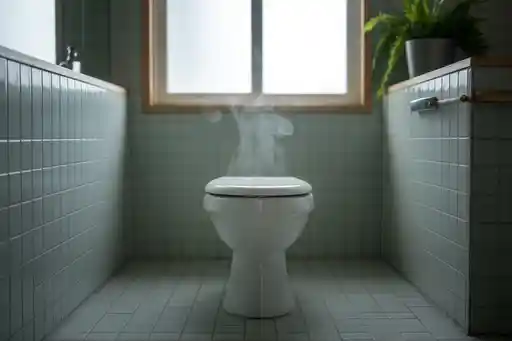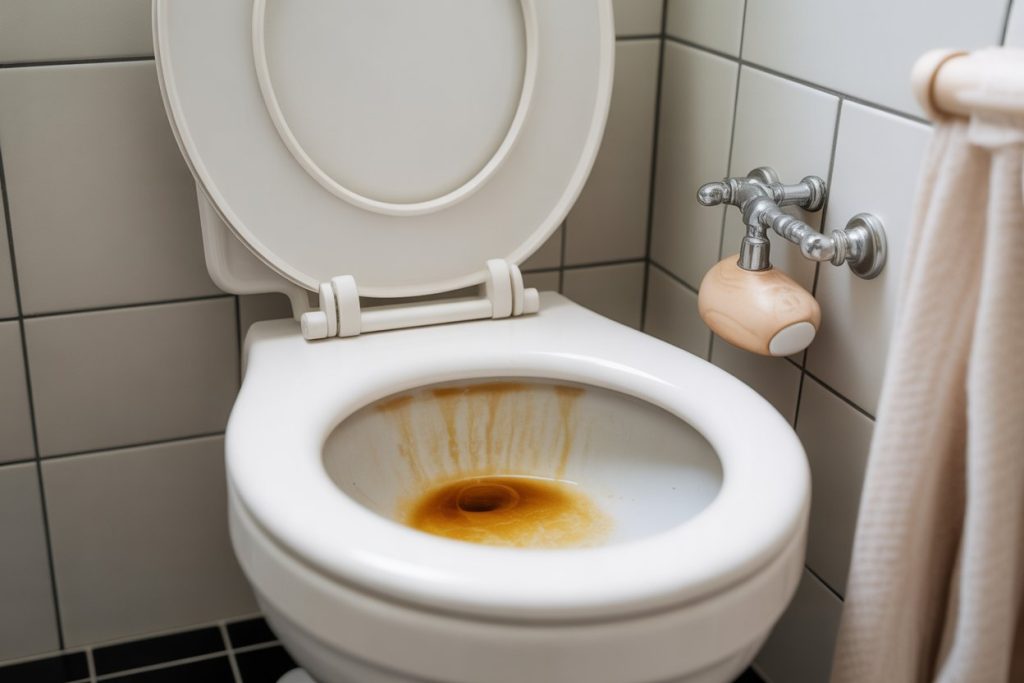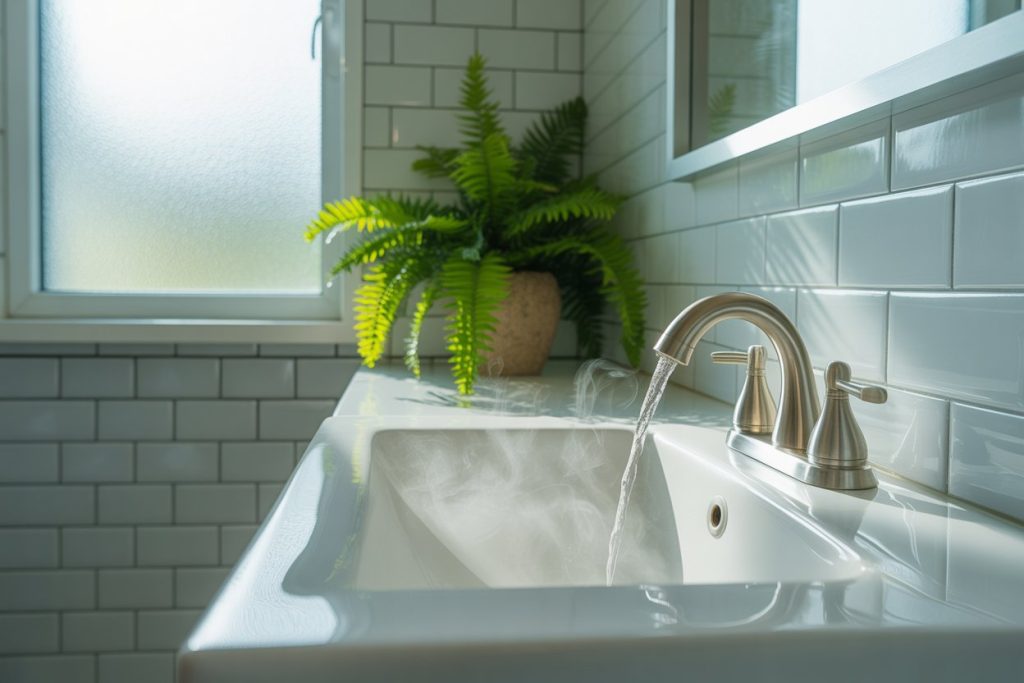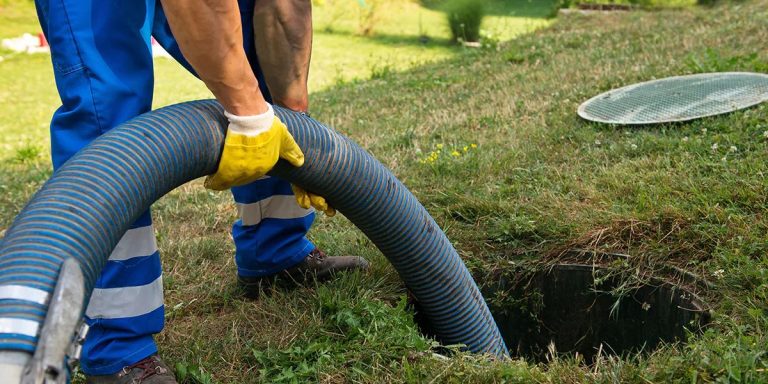How to Get Rid of Urine Smell in the Bathroom
A persistent urine smell in the bathroom is a common but frustrating problem. Even with regular cleaning, that unpleasant odor can linger, making the space feel unclean. This guide provides a comprehensive plan to identify the source of the smell, eliminate it for good, and prevent it from returning. We will walk you through everything from deep-cleaning techniques to knowing when it’s time to call in a professional.

Why Does My Bathroom Smell Like Urine?
Before you can tackle the odor, you need to find its source. The lingering urine smell in your bathroom often comes from more than just an unflushed toilet. Uric acid crystals, a component of urine, bind tightly to surfaces and are not water-soluble, which is why standard cleaning sometimes isn’t enough.
Common Causes of Urine Odor
- The Toilet: The most obvious culprit. Missed splashes around the rim, base, and even under the seat can build up over time. The wax ring sealing the toilet to the floor can also fail, allowing sewer gas and odors to escape.
- Floors and Grout: Porous materials like tile grout, unsealed stone, and even the subfloor can absorb urine. This is especially common in households with young children or pets.
- Walls and Baseboards: Splashes can hit nearby walls and baseboards. Since these areas aren’t cleaned as often as the toilet or floor, the odor can build up unnoticed.
- Drains: While less common, pouring urine down a shower or sink drain can lead to buildup in the P-trap, causing a persistent smell.
- Hidden Leaks: A slow, hidden leak from a pipe or a faulty toilet seal can saturate the subfloor, leading to a constant urine or musty odor.
Also Read Why Does My Bathroom Smell Like Sewage?
Step-by-Step Guide to Eliminating Urine Smell
Now that you know where to look, it’s time to deep clean. For best results, use an enzymatic cleaner, which contains enzymes that break down the uric acid crystals causing the odor.
1. Deep Cleaning the Toilet
A surface wipe-down isn’t enough to remove a deep-set urine smell in the bathroom.
- Shut Off and Drain: Turn off the water supply to the toilet and flush it to drain most of the water from the bowl and tank.
- Clean the Bowl: Pour an enzymatic cleaner or a mixture of vinegar and baking soda into the bowl. Let it sit for 15-20 minutes, then scrub thoroughly with a stiff-bristled brush, paying close attention to the area under the rim.
- Tackle the Exterior: Spray the entire exterior of the toilet with your cleaner. Use a cloth or paper towels to wipe down the tank, handle, lid, and seat (both sides).
- Remove the Seat: Use a screwdriver to remove the toilet seat completely. You’ll often find hidden grime and urine buildup in the hinge area. Clean the seat, hinges, and the porcelain underneath thoroughly.
- Clean the Base: Pay special attention to the base of the toilet and the caulking where it meets the floor. Use an old toothbrush to scrub away any buildup. Also, clean the floor directly around the toilet.
2. Cleaning Floors, Grout, and Walls
Porous surfaces require a specific approach to get rid of the urine smell.
- Identify the Spots: A UV blacklight can be a helpful tool. In a dark room, it will cause urine stains to glow, showing you exactly where you need to clean.
- Apply Cleaner: Saturate the affected areas on the floor, grout, and any splashed walls with an enzymatic cleaner. Don’t just wipe it; let the product soak in for at least 15-30 minutes so the enzymes have time to work.
- Scrub and Rinse: For grout and textured floors, use a scrub brush to work the cleaner into the surface. After scrubbing, rinse the area with a cloth dampened with clean water and dry it completely. For walls, a simple wipe-down after soaking should suffice.

Natural vs. Commercial Cleaning Solutions
You have several options for tackling urine odors, from DIY remedies to powerful commercial products.
Natural Odor Eliminators
- White Vinegar and Baking Soda: This classic duo is effective and affordable. Create a paste with baking soda and water, apply it to the smelly area, let it dry, and then spray it with white vinegar. The fizzing action helps lift the stain and neutralize the odor.
- Lemon Juice: The citric acid in lemon juice can help break down stains and leave a fresh scent. Mix it with water in a spray bottle for a quick refresh.
- Essential Oils: While they won’t break down uric acid, adding a few drops of tea tree, eucalyptus, or peppermint oil to your cleaning solution can help mask odors and provide antibacterial benefits.
Commercial Cleaners
When natural solutions aren’t strong enough, turn to commercial products designed specifically for this problem. Look for cleaners labeled as “enzymatic” or for “pet odor removal,” as these are formulated to destroy the organic compounds in urine.
Preventing Future Bathroom Urine Smells
Once your bathroom is fresh and clean, keep it that way with these preventive habits.
- Wipe Up Splashes Immediately: Make it a habit to quickly wipe the toilet rim and surrounding floor daily.
- Regular Deep Cleans: Schedule a thorough bathroom cleaning every one to two weeks.
- Improve Ventilation: Use the exhaust fan during and after showers to reduce moisture, which can trap odors.
- Consider a Rug: Place a washable rug around the base of the toilet to catch stray drips. Just be sure to wash it frequently in hot water.
- Teach Good Habits: In homes with children, especially boys, teach them to aim carefully and lift the seat.

When the Smell Won’t Go Away
If you’ve deep-cleaned every surface and the urine smell in your bathroom persists, it could indicate a more serious issue.
- Check the Wax Ring: A faulty wax seal under the toilet is a common cause of recurring odors. If you notice water pooling at the base of the toilet or the toilet feels wobbly, the ring likely needs to be replaced.
- Inspect for Hidden Leaks: A musty, sewer-like smell could point to a leak in the plumbing within the walls or under the floor. Look for signs of water damage like discolored flooring or peeling paint.
- Rule Out Pet Accidents: If you have pets, ensure they aren’t secretly using a corner of the bathroom as their personal potty spot.
When to Call a Professional
Don’t hesitate to call for help if the problem is beyond your scope.
- Call a Plumber: If you suspect a broken toilet seal, a hidden leak, or persistent sewer gas smells, a plumber can diagnose and fix the underlying issue safely.
- Call a Professional Cleaner: For deeply embedded odors in subflooring or extensive grout, a professional cleaning service has the specialized equipment and products to eliminate the smell permanently.
Also Read Can You Paint Bathroom Tile?
FAQs About Bathroom Odors
Q: Can a urine smell come from the shower drain?
A: Yes. If the P-trap under the drain dries out, sewer gas can escape. Pouring a cup of water down an unused drain can solve this. It can also occur if urine is frequently disposed of in the shower.
Q: How do I find the exact source of the urine smell?
A: Your nose is a good starting point. However, for a more precise method, use a UV blacklight in a dark room. It will make dried urine stains fluoresce, revealing hidden spots on floors, walls, and around the toilet.
Q: Why does my bathroom smell worse in hot weather?
A: Heat and humidity amplify odors. The moisture in the air allows the odor-causing bacteria to multiply faster, making the urine smell in your bathroom more noticeable.
A Fresh and Clean Bathroom Awaits
Eliminating a persistent urine smell in the bathroom requires more than a quick wipe-down. By systematically identifying the source, using the right cleaning products to break down uric acid, and adopting preventive habits, you can restore freshness to your space. A clean bathroom is a more pleasant and healthy environment for everyone in your home.
If you’ve tried everything and the odor still lingers, don’t let the problem get worse. Professional plumbers and cleaners have the expertise to solve even the toughest odor issues. Contact a certified professional bathroom remodel today to get your bathroom smelling fresh for good.
You can also Read our more info blogs.






